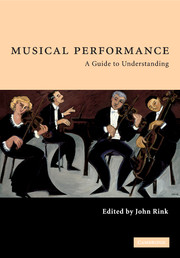6 - Developing the ability to perform
Published online by Cambridge University Press: 05 June 2012
Summary
This chapter examines the key factors involved in developing musical skills. Initially, the concept of musical potentiality is explored, followed by an investigation of the specific skills required for learning an instrument. Finally, a discussion is undertaken of how best to nurture the ability to perform for an audience. A balance between theory and practice is achieved by referring both to research literature on the psychology of music and music education and to anecdotal evidence and material from teaching manuals. Though some reference is made to musical learning in other cultures, the focus here is on a child developing the ability to perform within a Western cultural framework.
The relative roles of biology and environment in shaping musical potentiality
There has been considerable interest in the seeming differences in musical achievement among the population in general. Most of the debate has centred on the relative roles of biological and environmental influences on human abilities – the ‘nature versus nurture’ debate. Assessing the scientific findings, it seems that genetic factors influence general development in a number of ways:
• maturational staged development
An example of this is the need to crawl before walking, or in musical terms, the gradual development of the hand and eye dexterity and coordination necessary to enable bow and string synchronisation in violin playing.
• some physical advantages
For instance, tall, lean-limbed people tend to be better at high-jumping than short, more heavily built ones. In music, people with wide hand spans have a better potential to develop as pianists than those with small hand spans.
[…]
Information
- Type
- Chapter
- Information
- Musical PerformanceA Guide to Understanding, pp. 89 - 101Publisher: Cambridge University PressPrint publication year: 2002
References
Accessibility standard: Unknown
Why this information is here
This section outlines the accessibility features of this content - including support for screen readers, full keyboard navigation and high-contrast display options. This may not be relevant for you.Accessibility Information
- 9
- Cited by
